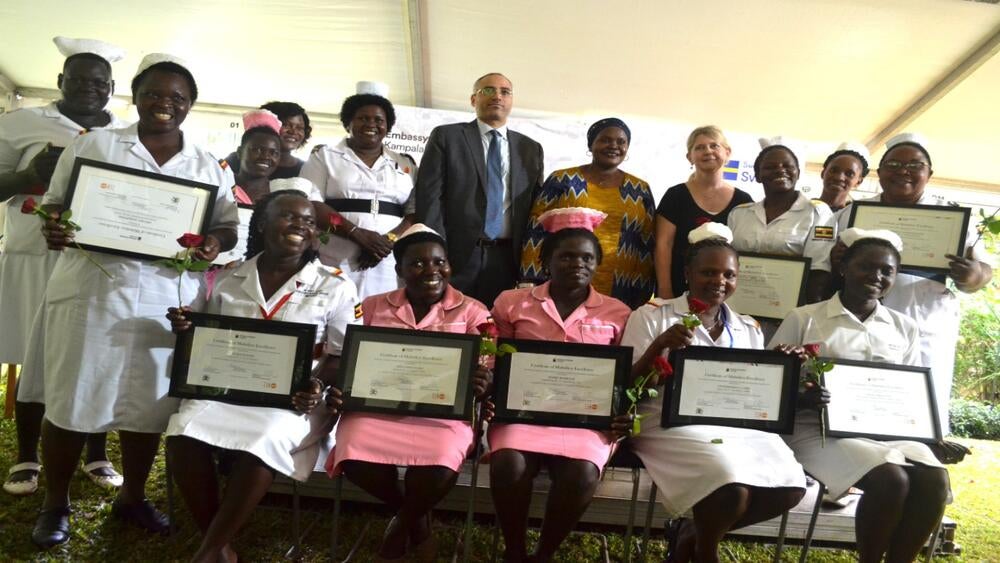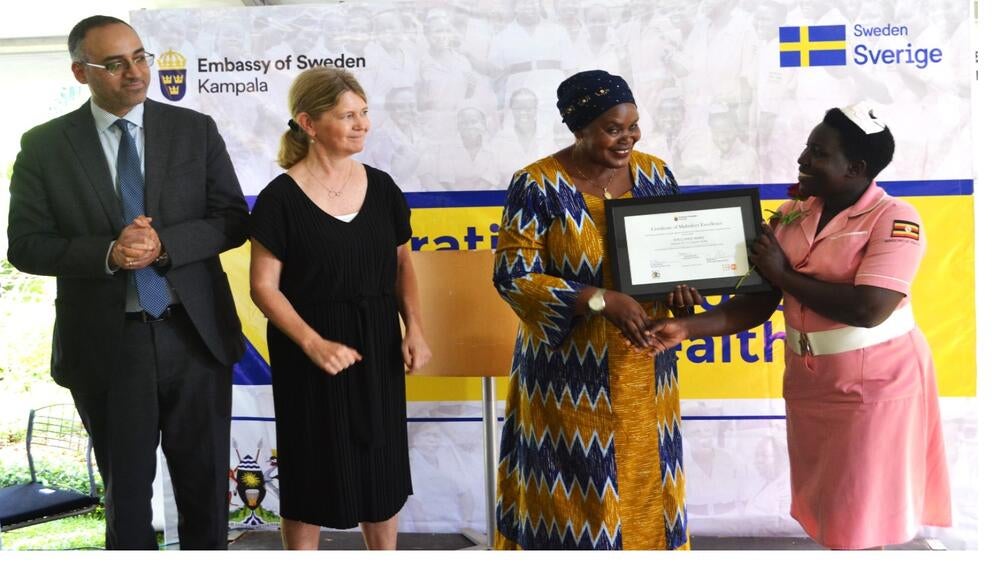KAMPALA: Uganda has seen great improvements when it comes to many health indicators over the years: reduced maternal and child mortality, increased number of antenatal visits and deliveries at health facilities with skilled health workers. These achievements are a testament to the dedication of healthcare professionals, especially midwives, who play a critical role in ensuring safe motherhood.
On 28 October, thirteen exceptional midwives from across Uganda were recognized for their outstanding contributions to maternal and child health at the annual #Midwives4All awards ceremony, held at the Embassy of Sweden in Kampala. This initiative, a collaboration between the Embassy of Sweden, UNFPA and the Ministry of Health, has been honouring midwives since 2015.
One of the awardees, Robinah Atizuyo, an enrolled midwife from the Oluvu Health Centre III in Maracha County, Maracha District of Northern Uganda, was nominated as the best midwife in the region after creating innovations that increased maternal deliveries by 15 percent in one year. She shared her inspiring story at the ceremony:
“When I joined the health centre in 2022, I realized that in our facility we were having low numbers of deliveries below the monthly target of 46 deliveries. Antenatal Care (ANC) was also low,” said Atizuyo, who had also been appointed caretaker for Maternal and Child Health (MCH) at the facility. “The facility was not doing well and many mothers were going to Traditional Birth Attendants (TBAs) and delivering from home. So in the first three months that I started working in that facility, I asked myself how I could improve this.”
“We later realized that many mothers were delivering from home because we usually mapped them during our community outreaches,” she continued. “So when we were informed that the mothers preferred delivering with the Traditional Birth Attendants (TBAs) rather than the health facility we went out to find out why.”
Describing how she addressed low delivery rates at her health centre, Atizuyo said when she learned that women preferred TBAs because they allowed delivery in a squatting position, which the women found more culturally appropriate and private. To increase hospital deliveries, Atizuyo adapted the practice at the health centre, accommodating the women's preferred birthing position. This change resulted in a 15% increase in facility deliveries within a year.

Atizuyo and her colleague then deliberately intensified their community outreach to convince the mothers to deliver at the health facility, where they would get free mama kits. They also took the initiative to engage TBA’s into the health system.
“Initially, they were not cooperative in fear of exposure, but after we convinced them about the dangers of delivering at home, including maternal and child deaths, they were convinced and understood. We requested them to refer or bring all the mothers who went to them for consultation to the facilities. They were responsive,” she said.
They also started mapping the pregnant mothers in the communities and enrolled them for ANC within the first three months. This progressed well due to the continued sensitization and health education on the importance of starting ANC within the first three months and delivering at the health facility.
H. E Maria Håkansson, Ambassador of Sweden in Uganda, gave special recognition to the midwives for their contribution to maternal health. She said midwives do more than just deliver babies, but are advocates for sexual and reproductive health and rights, a cornerstone of healthy, thriving communities.
“Today, we celebrate not just the individuals being awarded, but all midwives who give their all every single day across Uganda,” said Ambassador Håkansson, acknowledging the crucial efforts and commitments by midwives like Atiziyo to Uganda’s progress in maternal and child health over the years.
“Maternal mortality is falling, infant mortality is declining, and more mothers are receiving antenatal care and giving birth in the hands of skilled health professionals. These are not just statistics—these are lives saved, families uplifted and communities strengthened. And you, midwives, are at the center of this progress,” she highlighted.
However, while acknowledging the significant gains, Ambassador Håkansson also emphasized the need to address critical issues like gender-based violence, child marriages, and teenage pregnancies to achieve the Global Sustainable Development Goals by 2030.

Mr. Daniel Alemu, UNFPA Deputy Representative, recognized the Swedish government's vital support for UNFPA's mission as one of the top 10 funders of core resources.
“As a steadfast supporter of UNFPA’s mission, you champion the rights of women and girls through financial contributions and collaborative partnerships. These include the Maternal Health Thematic Fund which trains midwives. Your efforts underscore the essential work that these professionals (midwives) do every day,” he noted.
He also commended the Government of Uganda, particularly the Ministry of Health, for their leadership in improving midwifery services across the nation.
“Today, eight out of ten women in Uganda give birth with the assistance of a skilled birth attendant, typically a midwife—a significant milestone for maternal health. At UNFPA, we stand in solidarity with midwives, acknowledging their life-saving role, especially in providing Respectful Maternity Care,” he highlighted.
“In a world where every woman deserves dignity and compassion during childbirth, midwives are at the forefront, ensuring no mother or child dies during this sacred moment of life,” Mr. Alemu concluded.
Written by Evelyn Matsamura Kiapi


